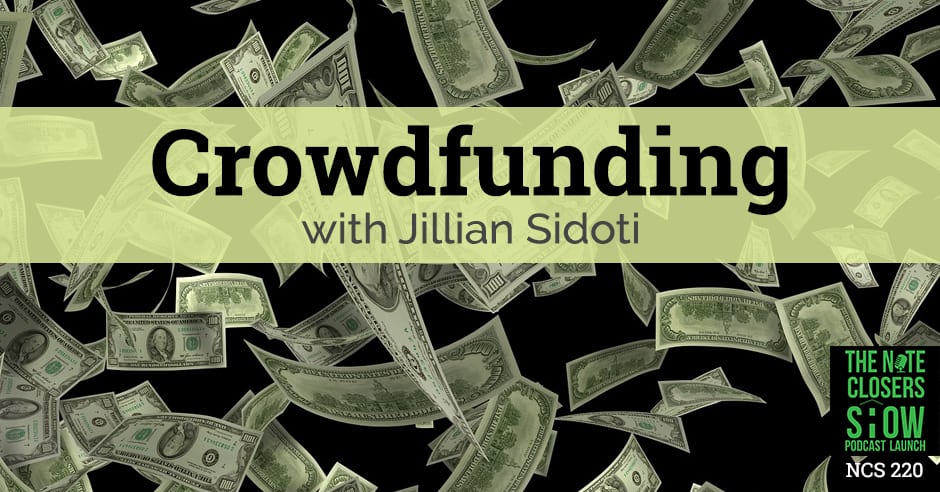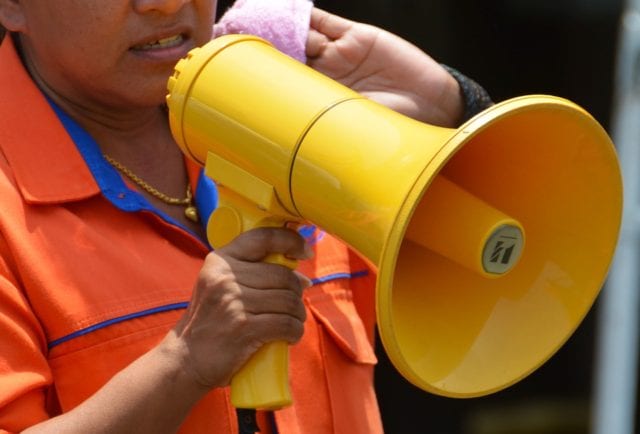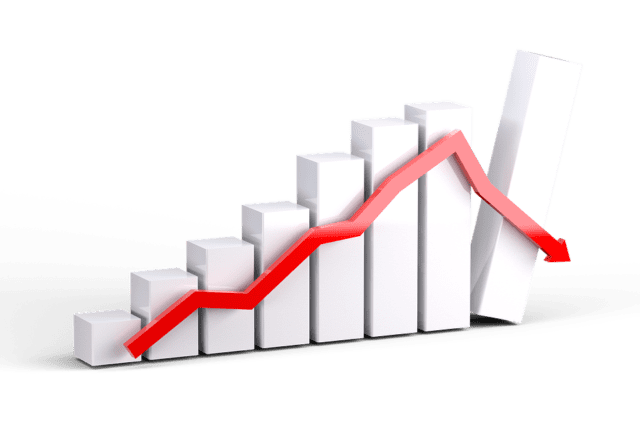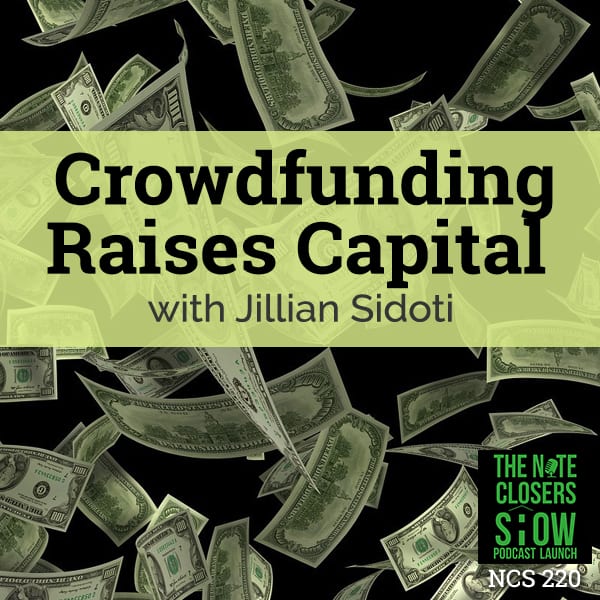
When real estate entrepreneurs need to understand their opportunity gaps, crowdfunding expert Jillian Sidoti tells them it’s time to take things to the next level by pooling in people. Crowdfunding raises capital because they reach an accredited investor audience as well as get to be surrounded by like-minded people. Learn how to sell successful business models to keep making money instead of just selling deals.
—
Listen to the podcast here
Crowdfunding Raises Capital with Jillian Sidoti
We’re excited to have us join us from Temecula, California, our good friend, rock star attorney, crowdfunding expert, Jillian Sidoti. How are you doing?
I’m doing great. Thanks. What an introduction.
I should also say shoe novice as well.
If you wear fancy shoes, it’s a conversation starter. Somebody will start talking to you. If you’re feeling a little shy at a networking event and sometimes we do have a conversation piece, and usually mine are my shoes.
As a true point, I bought Stephanie some Christian Louboutins for Christmas. I got them a half size too small, so she went in to Neiman Marcus thinking to swap out and made four friends walking out of there. Two of them are wanting to find more about what we do.
I’m not up to Christian Louboutin yet. I would like to move up to that but, I’m not quite there.
This lady knows her shiznit when it comes to raising capital or doing big things. Jillian, for those that don’t know who you are, share who you are and what you do and your expertise in the real estate industry.

Crowdfunding Raises Capital: I am your legal voice between you and your potential investors.
I am a licensed California attorney. I work all over the world. I have clients, mostly real estate entrepreneurs who are trying to raise money for their deals. What I do is I am your legal voice between you and your potential investors so that you can make sure that they’re fully informed of what they’re getting into and so that you’re legally compliant. I started off the same way a lot of people who are listening to this podcast started off. I was in a situation, I tried my hand at entrepreneurship at something else and found that I was just struggling so much. I was struggling so much because I financed the business on my credit card and found that was not the right way to finance a business. Literally, that parlayed into what I do today which is that helping entrepreneurs find the best way to finance their businesses.
Do it in bigger numbers too, correct?
Yeah. A lot of people who come to me, they start off with they’re raising money for a single-family flips and things like that. They’re trying to raise onesie, twosie deals or a little bit of money at a time. What they have to end up doing is giving that money back after the deal is over and then asking for that money again. What I tried to do is make it so that you don’t have to ask for the money back.
Whereas people oftentimes make it real simple like they’re doing individual deals. They’re selling the deal versus selling the business model. You really help people out especially with the PPMs, Private Placement Memorandums, and stuff like that. Selling the business model so it keeps the money in there churning.
Why do you want to get yourself on a hamster wheel of constantly asking for money? I’ve had some very, very successful people who have very much raised a lot of money doing that and have been very, very, very successful in doing that. Anyhow, I really try to get you off that hamster wheel because even though you might be very successful in raising money that way with one at a time deal like, “I have this one note that I’m buying at a discount and I’d like to JV with somebody.” It’s a great way to get started, not a great way to sustain your business. What’s going to end up happening is you’re going to be on that hamster wheel of constantly asking for money, constantly trying to get investors to be convinced of that particular deal. You’re going to find that your investors are going to start earmarking that money for something else and move on in some circumstances. This way we say to the investors, “I’m going to keep your money for three years. This is what I’m going to do with it. This is what I’m hoping to return to you.”
That’s a beautiful thing, tying up like an annuity or CD for a while to help go out and make things happen.
An annuity or a CD, a CD is a Certificate of Depreciation.
Or Certificate of Disappointment, I like to say.
No, that’s not what we want to do. It is going to be tied up in that sense, but the hope is that it’s making way more money than a CD or an annuity.
Good thing too, it’s making a lot more in CD and annuity but it’s also helping not the investor investing the money but the real estate investor, the real estate entrepreneur, being able to get somebody what’s called the preferred rate, which is going to be probably better than a normal joint venture where it’s a 50-50 split of things. Correct?
Exactly. I get so flustered about this because entrepreneurs don’t understand what their value is sometimes. That bothers me tremendously. A lot of entrepreneurs, particularly real estate entrepreneurs, don’t understand the value of being the person with the opportunity. All cash is green but not all investors are created equally. We also know that about opportunities. When we’re talking about real estate, we’re talking about an asset or a note in that situation. You’re talking about an asset that you can touch, feel, watch, foreclose on, whatever it might be. What we want to really take a look at is what is the best way to get investor money in, what is the best return that we can offer them without losing our shirts. A lot of times with the JV, those folks who are investing their money, I don’t want to diminish the value of that and the importance of that, but they’re investing money. Money is a fungible item that can be recreated. We can get more money. What we can’t get more of is time. I think a lot of our entrepreneur friends lose sight of that and think that the money is just as valuable as the time that you’re putting into it. I, a lot of the time not all the time, disagree with that sentiment. It’s just simply not true. You definitely need both. You need money and time to make things work. I don’t think it’s worth 50% of the deal that you’re working so hard on all the time.
There are a lot of times that people are working too hard, they don’t have the time. He who has the gold makes the rules. In this sense of the word, either a higher return is the gold or the fact that you’re able to help people put their money to work when they don’t have the time to do it.
You’re offering an opportunity that might not otherwise present itself. I see opportunities every day. I see brand new opportunities. I still jump at the chance of a good opportunity because the good opportunities don’t always present itself. If you really truly believe that your opportunity is a good one, you’ve got to go forth with an attitude that it’s a great opportunity and that your investors’ money although important is not the most important thing. The opportunity is the most important thing.
Let’s talk about setting expectations. I think that’s an important thing when people are raising capital not to overpromise and under-deliver. You want to under-promise and over-deliver.

Crowdfunding Raises Capital: The thing is you’ve got to look at reasonable expectations and what’s reasonable to make in this market at this time in this economy.
I’m an eternal optimist and I have the same tendency because I don’t want to disappoint anybody to do this myself. The thing is you’ve got to look at reasonable expectations and what’s reasonable to make in this market at this time in this economy. I don’t want to say the opportunities are getting smaller but they’re far and few between. There is less opportunity out there because the economy is doing so well. We see that especially in defaulted notes. Do you think we’re going to see the economists coming out? I do think we’re going to see an uptick in defaults. I’m buying an investment property myself and the notary came to my house with the closing documents. She did say to me, “I’m starting to see more short sales.” We are going to see that uptick. At this moment, we’re seeing that the opportunities are not as plentiful as they were perhaps several years ago. If that is the case and the margins are smaller, then you need to set the expectations of your investors as such and explain that to them. You explaining that to them is only going to make you look more like an expert. I didn’t know what I was talking about right there in the last statement, but I made myself sound like an expert. All I did was take a small little story of something that happened and I parlayed that into a nugget of truth and information for a potential investor so that they really understand the lay of the land.
I would agree with you because we see that especially in the defaulted note side. A lot of people say, “There’s not any opportunities.” There are plenty of opportunities. We do see uptick in defaults. I do see some more short sales hitting in the market especially the higher end markets. Over the last couple of years, we’ve been very spoiled because we’ve been in this note market basically with maybe 5,000 people or less. As the values have gone up and the REOs have dried up and the other traditional low-hanging fruit has dried up, we’ve had a lot of lien holders, we’ve had a lot of REO refugees coming to the note space looking for deals. The low-hanging fruit gets picked relatively quickly and the sellers up their prices. You’ve got to up your game going higher up the chain of the command going more direct to banks buying in bigger bulk purchases. You can get a phenomenal 2018. I’ve closed on about 150 notes in the last 120 days. Bought a lot, about half of them I’ve gotten re-performing so it’s phenomenal yields that we’re working through.
We’ve tweaked our formula. We probably have made offers on 700 assets and still walked away with about 150. It’s a lot of due diligence and stuff like that. We’ve upped our game on things. I think 2018 is the year of upping your game in going bigger. Let’s talk about going bigger with what you’re doing and helping some of your clients. One of the things that you are an expert as, and you have really cut your teeth, I think you are the premier expert in private placements and Reg A with the SEC filings and things like that. Let’s talk a little bit about that and how you’re helping some investors up their games in the New Year.
Reg A is also referred to as a mini IPO, which is an Initial Public Offering. It’s a public offering unlike a private placement memorandum, which are generally limited to only the wealthy or accredited investors and stuff like that. Many IPO allows an entrepreneur to raise money from anybody using general solicitation. What we mean by general solicitation is basically advertising for investors. I could be on this podcast right now if I were doing a Regulation A filing and say, “I’m raising note money for my note fund. We’re paying a 7% preferred return. Then, we’re splitting 20% of the backend with our investors. We invest in first, non-performings and second, performing notes throughout the country. We have a system in place that we have employed for the last 20 years.” That’s a real client of mine. You could go out and do that and raise money that way. Actually, one of my clients went back to the old methodology of the investor luncheons. I think they still do those in some regards. He’s killing it, raising money for notes via Reg A doing investor luncheons in Florida.
I can see why Florida works. It’s God’s waiting room. You’ve got a lot of people waiting around to die. If you give them free lunch, they’re good. That’s like the old Alan Cowgill way of doing things, “Let’s have a luncheon. Let’s have a dinner.” We see some of that. I see some of that here to the local restaurants from local financial advisers.
I’m not bashing on Alan Cowgill, but the way they were doing it back in the day was not legal. I could show you a multitude of cease and desist letters that say, “Doing these luncheons is not legal.” Regulators love free lunch. I’ve had regulators tell me they love free lunch, so they’ll find these ads for these free luncheons and go to them and then nail the people with a cease and desist. They’ll say, “Are you attending to this event? This is what happened. I was solicited for this investment. They’re not a registered security.” I can’t tell you how many clients of mine I had to dig out of holes because they did those luncheons and then solicited the audience. Now, we can solicit the audience. It’s just depending on how we do it. Do we do it so that it’s only to accredited investors or that we only accept money from accredited investors or do we do it under a Regulation A offering?
Let’s talk about what separates an investor from being accredited or non-accredited. What are some of those requirements or standards that we have to look at?
An accredited investor is somebody who makes $200,000 a year as an individual, $300,000 a year as a married couple or has a net worth of $1 million exclusive of their primary residence. It’s a pretty high threshold. According to the SEC, it depends on which statistic you read, but some statistics say that it’s 3% of the population and I’ve seen other statistics that say that’s only 10% of the population. It really can range.
That’s still important to keep in mind when you’re out talking to people and pre-qualifying your audience for what you’re trying to offer up, right?

Crowdfunding Raises Capital: Once they invest, you have to verify that they’re actually indeed accredited.
Exactly. I’m going to backtrack. Pre-2012, it was pretty much illegal for anybody who’s selling private securities to do any kind of general solicitation with whatsoever. Then post-2012 we saw the Crowdfunding Act, for lack of a better term. It’s not called that but for all intents and purposes, the Crowdfunding Act. One of those rules was that you will raise as much money as you want from accredited investors using general solicitation. You can market to anybody you want because quite frankly, how are you going to avoid having an un-accredited investor see your advertisement? You’re not. That’s impossible. You can advertise to the world. You can go anywhere and say, “I’m looking for investors.” It’s the point of investment. Once they invest, you have to verify that they’re actually indeed accredited.
That’s one of the big things we talked about investor profiles and taking the time to interview your clients. The old financial advisor and banker that comes out when I think about it, when people would come and sit down, we pull out a profile sheet, “Let’s talk about what are your goals? Where is your money at? Where is it tied up? If it hit a number, okay great. If it didn’t hit a number, we’ve got to go to a different route.”
I used to get these notifications or those mailers from Merrill Lynch or whatever saying, “Come to our free lunch.” I remember when I was pregnant with my second child, I would drag my first child with me because as a woman I’ll eat, on the time of Merrill Lynch, at some Italian restaurant. Then I would sign up for anything. I’ve been thinking about, “What crazy person does that for free lunch?”
You were technically as they call it in the radio station, a prizepig. You just wanted a steak or a chicken parmesan.
That’s exactly what I did. I’d roll right in, me and my husband and my oldest son. I’d be all pregnant and I’d just be like, “Good, free lunch. Thanks.” “Have you even thought of our services?” “No.”
“Thanks for the time though. See you next time. When is your next one? Next week? We’ll be back again.”
“I should buy annuities? Let me think about that. You can call me in a couple of days.”
You’ll give them your phone number but the last digit is wrong.
I’m saying this out loud going, “This is terrible.”
You were just there for the close. You were just there to perfect your closing. People there are looking to take their game to big level. Where do you see a lot of people starting Reg As or other things that when they start going? What kind of amount? Is it $1 million plus, $5 million, $30 million? Where do you start seeing people that are looking to raise money to start off with a PPM or a Reg A or whatever?
I think if you want to start with a PPM, you should always be looking at, “I’m going to raise more than $500,000 this year.” That’s how you want to think about it within any year. Then to go from that to the next level of Reg A, you have to think about two things. One, “Am I reaching an accredited investor audience with what I’m doing right now? Do I need to change? Do I have this massive audience that I can pull from that I’m not because I’m only getting from accredited investors?” When we talked about your business, we went through the same thing. You were raising money from accredited investors and realized, “I have this whole audience or this pool of students and people who don’t want to do the business.” I can’t tell you how many times I find people who go to real estate investing seminars and just realize, “I can’t. I don’t. I don’t want to,” with the effort.
I started off this conversation with saying, “It’s takes a lot of time and effort to do this business and that’s worth something.” Some people don’t want to put in that time and effort. They want to put in their money. Those people are not necessarily accredited. If you’re finding that you’re involved with a lot of people of that ilk, then it’s the time to start thinking about a Reg A. It’s not really a dollar number but if somebody came to me and said, “I just want to raise $1.5 million or something like that.” I, generally speaking, would not encourage them to do a Reg A. I really want to see Reg As for $5 million, $10 million or more at least. Most of my Reg As are around the $25 million to $50 million marks. There’s time and money associated with it. I don’t want you wasting your money on putting together these legal documents that are going to cost you a lot of money. I don’t want to mince words. They’re going to take you some time. I don’t want to see you doing that when you might have a very good pool of accredited investors that you can pull from or even if you do 506(b) as usually referred to as a friends and family round where it’s pre-existing relationships. You still need a private placement memorandum. I want you to be very aware. When you’re dealing with people who you have pre-existing relationships with and especially if they’re not accredited, you have to offer them full disclosure as to what is going on. If you’re raising less than $500,000, that might not necessarily look like a private placement memorandum. You do have to keep in mind that an accredited investors are entitled to full disclosure as to what the heck is going on with their money.
If you’re going to raise a $500,000, might as well just go for $1 million or more because it’s not going to be that much more difficult to do that when you’re out networking and talking with people. If it’s five people with $100,000 or ten people with $50,000 which is pretty easy to find if you’re doing any type of marketing or just networking at your local real estate clubs or things like that.
The other thing I want to say about that is that if you think about the amount of money that it takes to take down a really big pool or really big tape, you need serious cash and you need to come with cash ready to close. That’s how you get the good deals. I remember during the downturn, you can get pools for $0.03 on the dollar. I remember this one deal came across my desk. We needed $3 million cash to take it down. You can’t find that now.
That would have been the peak. Wells Fargo Financial was the cheapest I ever bought assets from. It was $2.50 of unpaid balance. My biggest regret is I didn’t buy more. We wish we could see that when that will happen again. Who knows? They said the RTC days never repeat themselves and we just went through that basically again. We’ll see it again. You’re right, you’ve got to have cash. You’ve got to be ready to pull the trigger. The biggest mistake I see a lot of people make as real estate entrepreneurs whether it’s notes or REOs is they use their own cash first because they’ve got some money saved, “I’m not going to raise any capital.” Then they use their own money on deals. They’re sitting around waiting for those deals to close or finish to get their money back so they can go buy more. They pass deals all day long because they didn’t take the time to really raise capital or take the time to put into their marketing and/or infrastructure through a Reg A.

Crowdfunding Raises Capital: That area between the great recession and now isn’t necessarily something that is unavoidable.
It’s going to happen again. It will. I’ll tell you it’s going to happen again. I know not because I have a crystal ball, but because there’s always real estate cycles. They’re not avoidable. We have this one in 2008 and it was terrible and it was awful but it still wasn’t the great depression, which means there is some gray area between the great depression and the great recession. Then there are some area between the great recession and now. That area between the great recession and now isn’t necessarily something that is unavoidable. I know it’s not unavoidable. I just know it’s not. If we look every twenty years or so, we see this cycle happening. If we look at the early ‘90s, lots of layoffs. Then right after September 11th, and then again we saw a recession in 2008. Now, everything I’m reading is saying about 2024, which is very optimistic if you ask me. 2024 is when we’re going to hit rock bottom. We have a couple of years of riding high on the hog.
That’s the big thing is preparing for that stuff. The best thing that you can do is to be prepared for that when it happens. That’s when millionaires were made, “When there’s blood in the water, dive in and buy as much as you can.”
My thought process right now is to sell as much as I can and put as much in liquid form as possible so that I can pull it out quickly. That $0.03 on the dollar doesn’t pass me by again. $100,000 is not going to cut it.
I’m friends with a buddy of mine, Greg Reid. I think you know Greg as well. He talks about how we’re an average of five people that we hang around the most whether it’s income or mindset or things like that. If people are wanting to up their level by surrounding themselves with a higher level of crowd, don’t you know of an upcoming event that they might be able to go out and network at?
Yes. Our firm is hosting an amazing event called CrowdConverge 2018. It’s in Las Vegas. It’s at a really nice hotel. I really want to encourage you to go to Crowd2018.com and look at our testimonial video there because the testimonial video says it all. It’s literally people who I know, a lot of them are my clients in that testimonial video who go, “I thought I was doing a lot of amazing things. Then I met a bunch of other people who are doing more amazing things than I am.” I don’t know anything to say about it except that the networking was phenomenal. It’s a no-sale, no-pitch event. It’s hosted by my firm. We just bring in people we know who have been successful in their field and they’re going to give you almost like a roadmap on how to crowdfund your deals in 2018. We’ve got all kinds of different people coming in and talking and different techniques.
A big thing for me is that I find that there are different comfort levels in terms of what people are comfortable with and how they market themselves. Some people like personal contacts. Some people like doing it on the internet. Some people just have an education-based approach like we’re doing right here, right now. It really runs the gamut on what you’re going to feel comfortable with in terms of how you market yourself and how you market your crowdfunding deals. We have all of those people coming in. Then we have all the support people coming in and saying what you need to do with your investors and how you need to treat them and really figuring out all the players you need to be successful in doing your crowdfunding deal.
Go check out that testimonial video because if nothing else, that will most certainly convince you of what you should be doing in 2018 with your business. I’m going to give some special bonuses to anybody who signs up from The Note Closers Show. If you email me after the fact of Note Closers, my email address is Jillian@CrowdfundingLawyers.net, I’m going to send you some free bonuses. I’m going to give you some guides. I’m going to give you some videos. I’m going to give you a copy of my book, The Crowd Funding Myth, totally for free so that you can get started and start researching right now before the event and make it your New Year’s resolution to crowdfund your business and raise the money that you need for your business. You can get that at $0.03 on the dollar.
It’s going to be in Vegas. Let’s talk about the dates of that. It might be important for people to note that, right?
Yeah. It’s February 1st and 2nd at the Mandalay Bay. Our room block is at the Delano, which is a super nice hotel at a discounted rate. Make sure you get your tickets and then immediately get your room block. We did sell out of the room block relatively early last year. Do make sure you get your room if you’re going to attend. I’m going to send you some videos. I’m going to send you some guides. I’m going to send you a white paper on the top five things you can do to crowdfund your business today. I’m going to send you a copy of my highly-rated book on Amazon, The Crowdfunding Myth, then you can start reading it. It’s a super-easy read. Also I’m writing a new book called Private Money Rockstar, which I’m hoping will be ready by CrowdConverge, and you’ll also get a free copy of that.

Crowdfunding Raises Capital: The Crowdfunding Myth: Legally and Effectively Raising Money for your Business
That’s some big bonuses for coming to Vegas. Trust me, anytime you can spend money on improving the people you hire whether on marketing or learning new tricks that most people are going to take the time to do, it is exponentially worth what you’re going to pay for the price of the tickets. The ticket price is $995. It’s Thursday and Friday at the Mandalay Bay in Vegas, room block at the Delano. Jillian is going to give you her two books and then you’re throwing in a home study course?
Yeah. I’m going to give you my home study course. It has six modules in it that will tell you how to raise money. I sell the home study course by itself for $14.95.
We’ve got your event marked on the calendar. It’s one of the first things we’ve had on the calendar for a while is just the fact that people talk about, “I thought I had great ideas and then I came and found something new.” When you’ve got one or two nuggets in event like this will exponentially shoot your business in the stratosphere and help give you some ideas to knock some things out of the park for you.
I’m telling you that the connections that were made from just the attendees amongst themselves alone, there is not one single attendee there that’s not on their game. If you’re feeling like you want to surround yourself with likeminded people who are achieving, this is the event to go to. There are tons of note buyers there. One of my Reg A clients who did a note buying fund was there and is in that testimonial video as well.
The Cashflow Divas are going to be there by any chance?
I don’t know. I should ask them. I have to find out.
I have not talked to Terri and Alia in quite some time. I’m going to give them a holler and just say, “What’s going on?” The cashflow brigade. Dealing with small investors can be the biggest pain in the ass that you have. The last thing you want to do is partner up or joint venture with somebody who’s got $10,000 total because they’re going to bother you every single day, “Where is that money? How is it performing?” You don’t want to deal with that. I get it when we’re all brand new. We’re hungry, we’re looking for capital and things like that. Trust me, it’s better to work a little bit harder, go out and network a little bit more to take things to the next level. Jillian, I know you’ve done some interesting things in the past with networking to surround yourself with a higher clientele, you want to share any of the fun things that you’ve done in the past?
I usually buy a first class plane ticket because you always find interesting people. As a matter fact, I’ve got a great story. I was flying first class from DFW to Nashville and the woman who sat next to me was coming in from Germany. She was an environmental lobbyist. She attended some kind of environmental convention in Germany. We just chatted and chatted and chatted. I said, “How did you get into this?” She goes, “I worked for Al Gore.” Then somehow we got into Hillary Clinton. This is the part that’s great. She goes, “I worked for Al Gore, so you know how I feel about Hillary Clinton.” I go, “No, I don’t. I would assume you like her. You didn’t like Hillary Clinton?” She goes, “I’m a lifelong democrat. I always vote democrat. I did not vote for Hillary Clinton. Everybody in the Al Gore camp hated Hillary Clinton.” I just started laughing. Another thing I did was, there were other reasons for this, not just from my perspective but from my children’s perspective. I put them in private school. I thought about it, “If I’m going to do this for myself, I want my children to have the same habits.” This is all costing money, I understand that but some of these things do cost money; a mastermind that cost money.
Here’s something that doesn’t cost a ton of money while you’re doing good. Charitable events, going to charitable dinners that might set you back $100 to $200 a plate, is a great place to meet people who not only have disposable income but are doing good and are probably half way decent people at the same time, while you’re supporting the cause that is important to you.
Didn’t you also bid on a tennis club membership or something like that a while back?
I did. I went to Malibu. I bid on a three-month long tennis club membership to the Malibu Tennis Club. I never made it there. All I did was really make a good charitable donation. I didn’t really think that through because I don’t live anywhere near Malibu.
You live in a great capital-raising area too there in Temecula, California, southern wine country. I’m a big advocate of wine networking, as we’d like to say. Being part of a wine club or going out. I’ve raised some great capital going out local, like wine clubs here in Steiner Ranch in South Austin. You’ll never know who you’re going to meet there. Often, if somebody is part of a wine club, they usually got a little bit of disposable income that they’re looking to put to work.
I belong to five wine clubs. I know that sounds like a lot. What’s funny is one of the wine clubs I hadn’t been to in eight months, I showed up there and I always do this right before Thanksgiving. I go, “I think I have some pick-ups.” “Yeah, you have some pick-ups. You have practically the whole year.” I ended up walking out of there with thirteen bottles of wine the day before Thanksgiving. After I went to all my wine clubs and picked up all the wine that I neglected over the last several months, I ended up with 42 bottles of wine. The thing about wine clubs is they’re usually not as expensive as they sound. For example here in Temecula, you belong to the wine club and all you’re doing is buying wine. That’s your obligation is to buy wine. The benefits of buying that wine far outweigh the cost of the wine. For example, what you get here is you usually get what are called free tastings. I can walk into a winery and get free tastings almost any day of the week for me and a couple of my friends. One of the wineries I belong to allows me to bring seven people every single day to go wine tasting, which is a great thing to do when I have clients in town and I want to impress them.
I’ve done that with you before. You’ve taken Stephanie and me to wine tasting before.
It doesn’t cost me anything. I’ve already paid for it in buying bottles of wine. That’s why these wine clubs are so advantageous. Then of course the networking that goes into going to the winery itself.

Crowdfunding Raises Capital: It’s all about upping your game and just talking to people around you when you’re at these places.
One of my favorite things I do is I like to buy sports tickets to go to games. I buy good tickets, front row or 50-yard line seats or good seats because I use it as a networking opportunity to talk to people around me because we have something in common, being fans and that’s an easy icebreaker. Buy them a beer, they’d buy a beer, we get to talk and exchange cards. I’ve raised quite a bit of money from that. Couple of years ago, I was also in the National REIA cruise. I’m in the Grand Cayman. I’m just walking around there. I walked to the Tiki Bar and ordered a grouper sandwich. I talked to this lady next to me, we’re just shooting the breeze. Just talking about half an hour. She goes, “You’ve got to meet my husband,” because she finds out what I do in real estate. “My husband is a real investor.” Taps me on the shoulder, he owns 200 Wendy’s throughout Florida. He owned the house that they filmed in The Firm, that Tom Cruise and Gene Hackman rent, literally blocked down. 30 minutes later, I’m in his house, drinking scotch, smoking a Cuban cigar. He’s given me a tour of the place and he’s talking about investing. I get home, there are emails, “I’ve got $100,000 to put. I’ve got $150,000.” It’s all about upping your game and just talking to people around you when you’re at these places.
Everything we just mentioned here is no great burden. Everything we just talked about is something fun to do. Your goal should never be, “I’m going to walk away with an investor today.” Your goal should be “I’m going to make friends. I’m going to network. I’m going to have a good time.” I know that’s why I say, “Come to CrowdConverge. Check out the videos I’m going to send you and look at the different ways that you can raise money.” Because for some people who are painfully shy, I am not one of those people but I get it. I get the overwhelmingness of talking to new people. If that doesn’t work for you, there’s plenty of other ways to go out and raise money. All of these ways, if you’re somewhat of an outgoing person, these are just social ways to make new friends and eventually find more investors. If you make this a habit, the money will follow.
Make it a habit and you will become a money magnet. Once again, you definitely want to check out Crowd2018.com for the CrowdConverge Summit, February 1st and 2nd in Vegas. Ticket price is $995 a person. If you go ahead and sign up for that and then send Jillian an email at Jillian@CrowdfundingLawyers.net, she’ll send you over the extra bonuses once you’re signed up for the event. Right, Jillian?
Yeah, exactly. Just send me an email and I’ll add you to the bonuses right away. This is a personal offer from me.
I want to thank you for taking time on your busy, hectic schedule. I know you’re getting ready to head out of town. Take advantage if you really want to kick start your year, February 1st and 2nd in Las Vegas, the CrowdConverge. Go to Crowd2018.com and get signed up. Trust me, it’s well-worth the investment. We look forward to seeing you there.
You have a good one. I’ll talk to you soon.
First of all, I want to say thank you for being a part of The Note Closers Show this amazing 2017. We started in October 2016 doing these daily Facebook Lives. It has really blossomed to something big. If you’re listening in iTunes and you’re one of our under 50,000 download listeners, thank you so much for being a part of our extended Note family and Note crew. We have obviously learned a lot about doing these events in our podcast and are constantly tweaking what we’re doing and what we’re sharing. It’s always a fun, fun time. It’s actually one of the things I look forward to each day, being able to connect with our extended tribe all across the United States and also to our international listeners too. Once again, thank you so much for making 2017 a very special year. We look forward and want to drink to your success in 2018. Go out, make something happen. If you really want to make a change in your life, in your business, you’ve got to start upping your game. Surround yourself with great people. You’re an average of the five people that you hang out with the most and maybe you’ve got to up your game. Put some friends on the side or the back burner so you can take care of yourself. Instead of you trying to feed the world with an empty cup, fill your cup and feed the rest of the world with what your cup runs over. On behalf of everybody at We Close Notes and The Note Closers Show, I want to thank all of our guests, all of our listeners, all of our downloads, all of those who have left a review, thank you so much. Go out and make something happen. We look forward to your continued success in 2018. We’ll see you all at the top.
Important Links
- CrowdConverge 2018
- Jillian@CrowdfundingLawyers.net
- The Crowd Funding Myth
- Testimonial video
- National REIA cruise
- Jillian Sidoti
- Crowd2018.com

